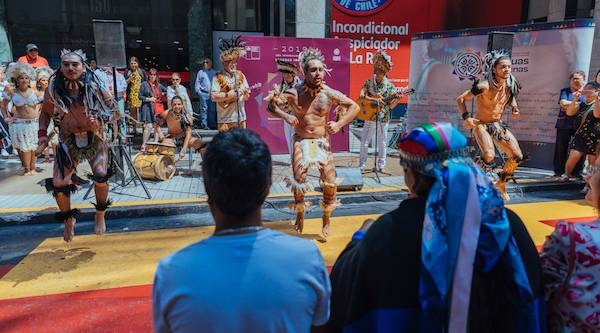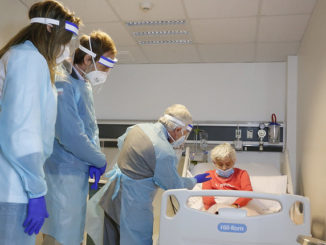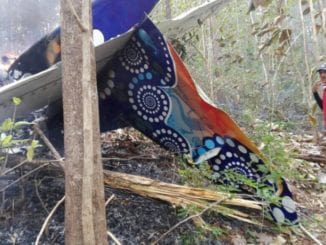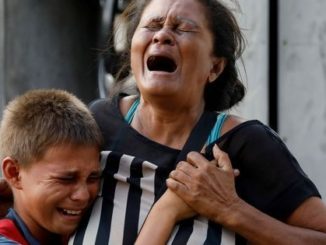
SANTIAGO – To celebrate the International Day of Mother Tongue, the Chilean government Thursday began the Year of Indigenous Languages to promote six indigenous languages spoken today in this South American country.
For this, the Ministry of Social Development, Ministry of Culture, Arts and Heritage, Ministry of Justice and Human Rights, Ministry of Foreign Affairs and Ministry of Education and with the support of Unesco, came together to launch a series of initiatives and activities for the conservation and revitalization of Indigenous languages.
The launching activity was carried out in the Paseo Bandera, in the center of Santiago, and the Undersecretary of Social Services, Sebastián Villarreal, participated in it; the minister of Cultures, Arts and Heritage, Juan Carlos Silva; and the Undersecretary of Human Rights, Lorena Recabarren as well as representatives of the Mapuche and Rapa Nui peoples.
En el #DíadelaLenguaMaterna lanzamos el Año de las Lenguas Indígenas, como un compromiso de Gobierno con su reconocimiento y revitalización, potenciando el traspaso del conocimiento ancestral a las nuevas generaciones. Gracias por acompañarnos a este hito en Paseo Bandera. pic.twitter.com/gV1ji80wJS
— Ministerio de las Culturas (@culturas_cl) February 21, 2019
In his speech, undersecretary Villarreal stressed that our country joined a global initiative promoted by the United Nations to promote the rescue and preservation of cultural manifestations such as language.
“The Ministry of Social Development is responsible for the National Agreement for the Araucanía, where one of the most important axes is recognition for the appreciation and cultural diversity that exists in our country. A concrete sample that we are giving on that relevance is to fold ourselves to this international effort to celebrate the year of the indigenous languages, with the conservation and the revitalization of the six indigenous languages that are spoken today in Chile,” indicated the undersecretary.
The authority said that today our country faces a worrying reality, where 80% of those who declare belonging to an indigenous people do not speak or understand the indigenous language. “Faced with this reality, we are moving forward in a coordinated effort between the ministries of Social Development, Culture, Education, Justice and Foreign Affairs, to promote and revitalize the indigenous language.”
During the activity, the authorities gave recognition to Rosa Córdova, Alipio Pacheco and Florentino Hey, for the important work they have done to promote and disseminate the Mapuche, Quechua and Rapa Nui languages.
En el #DíadelaLenguaMaterna lanzamos el Año de las Lenguas Indígenas, como un compromiso de Gobierno con su reconocimiento y revitalización, potenciando también el traspaso del conocimiento ancestral a las nuevas generaciones. https://t.co/ubhGUwnuiq #HablemosNuestrasLenguas pic.twitter.com/EpOyRm7kOw
— Gobierno de Chile (@GobiernodeChile) February 21, 2019
Free mapuzugun courses
Among the activities that stand out is the realization of basic mapuzugun e-learning courses that will be taught during next March.
The courses, which will be open for those who register at the government websites (www.cultura.gob.cl; and www.biblioredes.cl), will have 80 pedagogical hours, are divided into 4 modules and will be available for a period of 6 months with a cap of 5 thousand students per year, thanks to the initiative organized by Biblioredes and the Department of Native Peoples of the National Cultural Heritage Service (SNPC).
“These free courses will allow us to enter, learn and learn about the Mapuzugun. This gives an account of the purpose we have: to incorporate into indigenous languages those who -sometimes- do not feel them proper to our culture and national identity,” stressed Juan Carlos Silva.
Other initiatives planned for this year by the Ministry of Culture, Arts and Heritage are the holding of a seminar on experiences of Linguistic Revitalization, planned for next October in the regions of La Araucanía and Metropolitana; as well as the II research days of the Book and Reading, whose central theme will be the revitalization of indigenous languages, and which is scheduled for July of this year and is organized from the National Reading and Book Policy.



